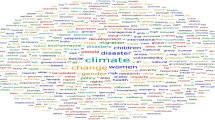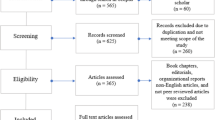Abstract
This article investigates the influence of exposure to the IPCC special report on 1.5 °C global warming on climate change attitudes. Among a nationally representative sample of the Norwegian public, we found that exposure to the report is associated with greater perceived threat from climate change and increased climate change concern. However, this association was modestly moderated by political orientation. Exposure to the report had a weaker association with perceived threat and climate change concern among politically right-leaning individuals, compared with their left-leaning counterparts, and there was no association between exposure to the report and climate change concern among individuals who self-identified as being on the far-right end of the political spectrum. We conclude that, despite the commonly observed tendency for biased assimilation of climate change information and polarisation of opinion among the public, scientific communication regarding climate risks may still have a viable role to play in promoting climate change engagement and action.


Similar content being viewed by others
Notes
This may have been partly due to the timing of the report launch (2 am UK time); see https://twitter.com/LeoHickman/status/1049169116546961409.
Self-reported levels of climate change concern in Wave 11 for respondents exposed to the IPCC special report (M = 3.10, SD = 0.94) and those who had not encountered the report (M = 2.87, SD = 0.98) were not significantly different (t(518) = -1.96, p = 0.051). This supports the internal validity of our longitudinal analysis.
A detailed report of the conditional effects of exposure to the IPCC special report on perceived threat and concern at the different percentiles of political orientation scores is available as supplementary data (Table S2).
The was no significant correlation between climate change concern in Wave 11 and self-reported exposure to the IPCC special report in Wave 14 among the longitudinal sample (r = 0.03, p = 0.451).
References
Aasen M (2017) The polarization of public concern about climate change in Norway. Clim Pol 17:213–230. https://doi.org/10.1080/14693062.2015.1094727
Arlt D, Hoppe I, Wolling J (2011) Climate change and media usage: effects on problem awareness and behavioural intentions. Int Commun Gaz 73:45–63. https://doi.org/10.1177/1748048510386741
Asiyanbi IE (2018) Rovaniemi people respond positively to IPCC’s stiffer target. The Daily Finland. http://www.dailyfinland.fi/weather/7797/Rovaniemi-people-respond-positively-to-IPCCu00b4s-stiffer-target/print. Accessed 3 Apr 2019
Bruine de Bruin W, Lefevre CE, Taylor AL et al (2016) Promoting protection against a threat that evokes positive affect: the case of heat waves in the United Kingdom. J Exp Psychol Appl 22:261–271. https://doi.org/10.1037/xap0000083
Carbon Brief (2018) In-depth Q&A: The IPCC’s special report on climate change at 1.5C. https://www.carbonbrief.org/in-depth-qa-ipccs-special-report-on-climate-change-at-one-point-five-c. Accessed 2 Apr 2019.
Chemnick J (2018) U.S. Stands with Russia and Saudi Arabia against climate science. Scientific American. https://www.scientificamerican.com/article/u-s-stands-with-russia-and-saudi-arabia-against-climate-science/. .
Corner A, Whitmarsh L, Xenias D (2012) Uncertainty, scepticism and attitudes towards climate change: biased assimilation and attitude polarisation. Clim Chang 114:463–478. https://doi.org/10.1007/s10584-012-0424-6
Damerell P, Howe C, Milner-Gulland EJ (2013) Child-orientated environmental education influences adult knowledge and household behaviour. Environ Res Lett 8:015016. doi: https://doi.org/10.1088/1748-9326/8/1/015016
Davenport C (2018) Major climate report describes a strong risk of crisis as early as 2040. New York Times https://www.nytimes.com/2018/10/07/climate/ipcc-climate-report-2040.html. Accessed 3 Apr 2019.
Doran M (2018) Environment minister says top climate scientists got it wrong over coal report. ABC News. https://www.abc.net.au/news/2018-10-09/environment-minister-says-calls-to-end-coal-drawing-long-bow/10354604. .
Dotzek N, Groenemeijer P, Feuerstein B, Holzer AM (2009) Overview of ESSL’s severe convective storms research using the European Severe Weather Database ESWD. Atmos Res 93:575–586. https://doi.org/10.1016/J.ATMOSRES.2008.10.020
Drummond C, Fischhoff B (2017) Individuals with greater science literacy and education have more polarized beliefs on controversial science topics. Proc Natl Acad Sci 114:9587–9592. https://doi.org/10.1073/pnas.1704882114
European Council (2018) Climate change: council adopts conclusions. https://www.consilium.europa.eu/en/press/press-releases/2018/10/09/climate-change-council-adopts-conclusions/. Accessed 2 Apr 2019
Eustachewich L (2018) Terrifying climate change warning: 12 years until we’re doomed. New York Post. https://nypost.com/2018/10/08/terrifying-climate-change-warning-12-years-until-were-doomed/. Accessed 2 Apr 2019
Fjellberg A (2018) Klimarapporten: Verden må gjennom endringer i et omfang vi aldri før har sett. Dagbladet
Fridays For Future Austria (2019) Über uns. https://www.fridaysforfuture.at/about. Accessed 2 May 2019
Fridays for Future Germany (2019) Unsere Forderungen an die Politik. https://fridaysforfuture.de/forderungen/. Accessed 2 May 2019
Glover S (2018) False warnings about climate change make us more sceptical. Daily Mail Online. https://www.dailymail.co.uk/debate/article-6263143/STEPHEN-GLOVER-False-warnings-climate-change-make-sceptical.html. Accessed 3 Apr 2019
Guber DL (2013) A cooling climate for change? Party polarization and the politics of global warming. Am Behav Sci 57:93–115. https://doi.org/10.1177/0002764212463361
Hamilton LC (2012) Did the Arctic ice recover? Demographics of True and False Climate Facts. Weather Clim Soc 4:236–249. https://doi.org/10.1175/WCAS-D-12-00008.1
Hamilton LC, Hartter J, Lemcke-Stampone M et al (2015) Tracking public beliefs about anthropogenic climate change. PLoS One 10:e0138208. https://doi.org/10.1371/journal.pone.0138208
Howe PD, Marlon JR, Mildenberger M, Shield BS (2019) How will climate change shape climate opinion? Environ Res Lett 14:113001. https://doi.org/10.1088/1748-9326/ab466a
IPCC (2018) Global warming of 1.5 °C. An IPCC special report on the impacts of global warming of 1.5 °C above pre-industrial levels and related global greenhouse gas emission pathways, in the context of strengthening the global response to the threat of climate change,. In Press
Jensen BB (2002) Knowledge, action and pro-environmental behaviour. Environ Educ Res 8:325–334. https://doi.org/10.1080/1350462022014547
Kahan DM, Braman D, Gastil J et al (2007) Culture and identity-protective cognition: explaining the white-male effect in risk perception. J Empir Leg Stud 4:465–505. https://doi.org/10.1111/j.1740-1461.2007.00097.x
Kahan DM, Peters E, Wittlin M et al (2012) The polarizing impact of science literacy and numeracy on perceived climate change risks. Nat Clim Chang 2:732–735. https://doi.org/10.1038/nclimate1547
Kalaugher L (2018) IPCC special report on 1.5 °C: the reaction. Physics World. https://physicsworld.com/a/ipcc-special-report-on-1-5-c-the-reaction/. Accessed 3 Apr 2019
Konisky DM, Hughes L, Kaylor CH (2016) Extreme weather events and climate change concern. Clim Chang 134:533–547. https://doi.org/10.1007/s10584-015-1555-3
Krange O, Kaltenborn BP, Hultman M (2019) Cool dudes in Norway: climate change denial among conservative Norwegian men. Environ Sociol 5:1–11. https://doi.org/10.1080/23251042.2018.1488516
Lord CG, Ross L, Lepper MR (1979) Biased assimilation and attitude polarization: the effects of prior theories on subsequently considered evidence. J Pers Soc Psychol 37:2098–2109. https://doi.org/10.1037/0022-3514.37.11
Lujala P, Lein H, Rød JK (2014) Climate change, natural hazards, and risk perception: the role of proximity and personal experience. Local Environ:1–21. https://doi.org/10.1080/13549839.2014.887666
Marquart-Pyatt ST, McCright AM, Dietz T, Dunlap RE (2014) Politics eclipses climate extremes for climate change perceptions. Glob Environ Chang 29:246–257. https://doi.org/10.1016/j.gloenvcha.2014.10.004
Mathismoen O (2018) Klimapanelet: Verdens utslipp må halveres de neste 12 årene. Aftenposten. https://www.aftenposten.no/verden/i/rLRBE8/Klimapanelet-Verdens-utslipp-ma-halveres-de-neste-12-arene. Accessed 9 Apr 2019.
Mayer A, Shelley TO, Chiricos T, Gertz M (2017) Environmental risk exposure, risk perception, political ideology and support for climate policy. Sociol Focus:1–20. https://doi.org/10.1080/00380237.2017.1312855
McCright AM, Dunlap RE (2011) The politicization of climate change and polarization in the American public’s views of global warming, 2001-2010. Sociol Q 52:155–194. https://doi.org/10.1111/j.1533-8525.2011.01198.x
McCright AM, Xiao C, Dunlap RE (2014) Political polarization on support for government spending on environmental protection in the USA, 1974-2012. Soc Sci Res 48:251–260. https://doi.org/10.1016/j.ssresearch.2014.06.008
McCright AM, Dunlap RE, Marquart-Pyatt ST (2016) Political ideology and views about climate change in the European Union. Env Polit 25:338–358. https://doi.org/10.1080/09644016.2015.1090371
McGrath M (2018a) Climate change: COP24 fails to adopt key scientific report. BBC News. https://www.bbc.com/news/science-environment-46496967. Accessed 3 Apr 2019
McGrath M (2018b) Five things we have learned from the IPCC report. BBC News. https://www.bbc.com/news/science-environment-45784892. Accessed 3 Apr 2019
Milfont TL (2012) The interplay between knowledge, perceived efficacy, and concern about global warming and climate change: a one-year longitudinal study. Risk Anal 32:1003–1020. https://doi.org/10.1111/j.1539-6924.2012.01800.x
Milman O (2018) Trump quiet as the UN warns of climate change catastrophe. The Guardian. https://www.theguardian.com/us-news/2018/oct/09/trump-climate-change-report-ipcc-response. Accessed 2 Apr 2019.
Mohdin A, Taylor M, Blackall M (2019) Extinction rebellion protesters stop traffic in London’s financial hub. The Guardian. https://www.theguardian.com/environment/2019/apr/24/extinction-rebellion-declares-end-to-london-protests. Accessed 25 Apr 2019
Newman N, Fletcher R, Kalogeropoulos A et al (2018a) Reuters Institute Digital News Report 2018. UK, Oxford
Newman TP, Nisbet EC, Nisbet MC (2018b) Climate change, cultural cognition, and media effects: worldviews drive news selectivity, biased processing, and polarized attitudes. Public Underst Sci 27:985–1002. https://doi.org/10.1177/0963662518801170
O’Connor RE, Bord RJ, Fisher A (1999) Risk perceptions, general environmental beliefs, and willingness to address climate change. Risk Anal 19:461–471. https://doi.org/10.1023/A:1007004813446
Ogunbode CA, Böhm G, Capstick SB et al (2019) The resilience paradox: flooding experience, coping and climate change mitigation intentions. Clim Pol 19:703–715. https://doi.org/10.1080/14693062.2018.1560242
Poortinga W, Spence A, Whitmarsh L et al (2011) Uncertain climate: An investigation into public scepticism about anthropogenic climate change. Glob Environ Chang 21:1015–1024. https://doi.org/10.1016/j.gloenvcha.2011.03.001
Rognstrand A (2018) Forskere: 1,5 grader oppvarming globalt kan bli 3 grader i Norge. VG. https://www.vg.no/nyheter/innenriks/i/Kv4BlM/forskere-15-grader-oppvarming-globalt-kan-bli-3-grader-i-norge. Accessed 5 Aug 2019.
Rommetveit A (2018) FN: Verden må gjøre endringer som menneskeheten aldri før har sett maken til. NRK. https://www.nrk.no/hordaland/fn_-verden-ma-gjore-endringer-som-menneskeheten-aldri-for-har-sett-maken-til-1.14237347. Accessed 9 Apr 2019
Sampei Y, Aoyagi-Usui M (2009) Mass-media coverage, its influence on public awareness of climate-change issues, and implications for Japan’s national campaign to reduce greenhouse gas emissions. Glob Environ Chang 19:203–212. https://doi.org/10.1016/j.gloenvcha.2008.10.005
Shi J, Visschers VHM, Siegrist M (2015) Public perception of climate change: the importance of knowledge and cultural worldviews. Risk Anal 35:2183–2201. https://doi.org/10.1111/risa.12406
Shi J, Visschers VHM, Siegrist M, Arvai J (2016) Knowledge as a driver of public perceptions about climate change reassessed. Nat Clim Chang 6:759–762. https://doi.org/10.1038/nclimate2997
Simon F (2019) Greta Thunberg: ‘We just want politicians to listen to the scientists.’ Euractiv.com. https://www.euractiv.com/section/climate-environment/news/greta-thunberg-we-just-want-politicians-to-listen-to-the-scientists/. Accessed 25 Apr 2019.
Stefanini S (2018) Australia won’t give money to Green Climate Fund, says PM. Climate Home News. https://www.climatechangenews.com/2018/10/08/australia-wont-give-money-green-climate-fund-says-pm/. Accessed 3 Apr 2019.
Sterman JD, Sweeney LB (2007) Understanding public complacency about climate change: adults’ mental models of climate change violate conservation of matter. Clim Chang 80:213–238. https://doi.org/10.1007/s10584-006-9107-5
Stevenson K, Peterson N (2016) Motivating action through fostering climate change hope and concern and avoiding despair among adolescents. Sustainability 8:6. https://doi.org/10.3390/su8010006
Stroud NJ (2010) Polarization and partisan selective exposure. J Commun 60:556–576. https://doi.org/10.1111/j.1460-2466.2010.01497.x
Sundblad EL, Biel A, Gärling T (2007) Cognitive and affective risk judgements related to climate change. J Environ Psychol 27:97–106. https://doi.org/10.1016/j.jenvp.2007.01.003
Taylor M, Vaughan A (2018) Overwhelmed by climate change? Here’s what you can do. The Guardian https://www.theguardian.com/environment/2018/oct/08/climate-change-what-you-can-do-campaigning-installing-insulation-solar-panels. Accessed 3 Apr 2019.
Taylor A, de Bruin WB, Dessai S (2014) Climate change beliefs and perceptions of weather-related changes in the United Kingdom. Risk Anal 34:1995–2004. https://doi.org/10.1111/risa.12234
The Guardian (2018) ‘The heatwave was a wake up call’: readers on a year of climate change anxiety. The Guardian. https://www.theguardian.com/environment/2018/dec/21/the-heatwave-was-a-wake-up-call-readers-on-a-year-of-climate-change-anxiety. Accessed 3 Apr 2019.
Thomas A (2018) Time to wake up: climate change is already here. ScienceNordic. http://sciencenordic.com/time-wake-climate-change-already-here
Tobler C, Visschers VHM, Siegrist M (2012) Consumers’ knowledge about climate change. Clim Chang 114:189–209. https://doi.org/10.1007/s10584-011-0393-1
Tollersrud E (2018) Milevis fra klimamålene. Klassekampen. https://www.klassekampen.no/article/20181009/ARTICLE/181009967. Accessed 5 Aug 2019.
Tranter B, Booth K (2015) Scepticism in a changing climate: a cross-national study. Glob Environ Chang 33:154–164. https://doi.org/10.1016/j.gloenvcha.2015.05.003
van der Linden S (2014) The social-psychological determinants of climate change risk perceptions: towards a comprehensive model. J Environ Psychol 41:112–124. https://doi.org/10.1016/j.jenvp.2014.11.012
Weber EU (2006) Experience-based and description-based perceptions of long-term risk: why global warming does not scare us (yet). Clim Chang 77:103–120. https://doi.org/10.1007/s10584-006-9060-3
Weston P, Pettit H (2018) Eat less meat and give up your car: “unprecedented” changes humanity must make by 2030 to avoid catastrophic climate change. Daily Mail Online. https://www.dailymail.co.uk/sciencetech/article-6252785/UN-report-reveals-unprecedented-changes-humanity-make-avoid-heat-drought-floods-2050.html. Accessed 3 Apr 2019.
Whitmarsh L (2011) Scepticism and uncertainty about climate change: dimensions, determinants and change over time. Glob Environ Chang 21:690–700. https://doi.org/10.1016/j.gloenvcha.2011.01.016
Author information
Authors and Affiliations
Corresponding author
Additional information
Publisher’s note
Springer Nature remains neutral with regard to jurisdictional claims in published maps and institutional affiliations.
Electronic supplementary material
ESM 1
(DOCX 17 kb)
Rights and permissions
About this article
Cite this article
Ogunbode, C.A., Doran, R. & Böhm, G. Exposure to the IPCC special report on 1.5 °C global warming is linked to perceived threat and increased concern about climate change. Climatic Change 158, 361–375 (2020). https://doi.org/10.1007/s10584-019-02609-0
Received:
Accepted:
Published:
Issue Date:
DOI: https://doi.org/10.1007/s10584-019-02609-0




